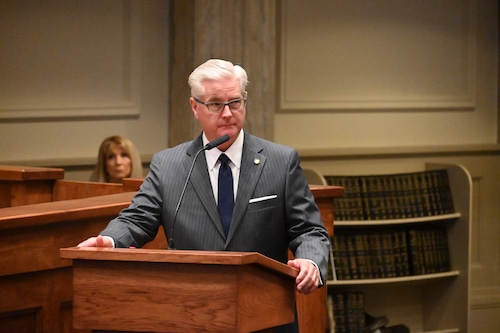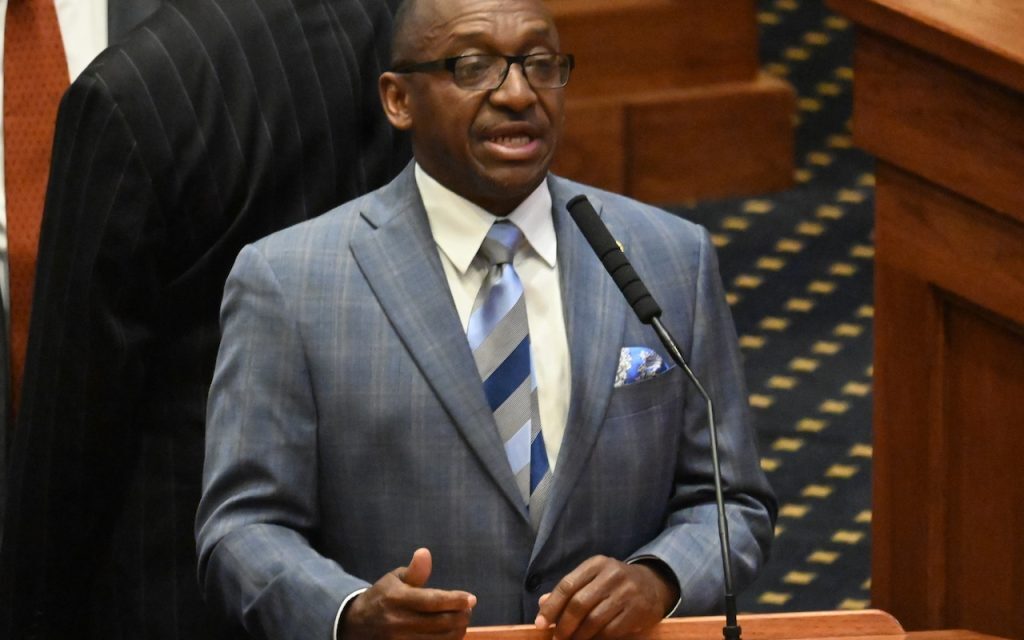By John Sharp
The Alabama Senate voted in support of legislation Thursday giving teachers eight weeks of paid parental leave, only for the chamber’s president to say he wasn’t transmitting the measure to the House for further consideration this year.
The move upset the sponsor of SB305 – Sen. Vivian Figures, D-Mobile – who said she “ought to leave the Senate” and start “energizing women to let them know the power we all have.”
“It stings that you voted that it not be transmitted,” Figures said after Senate President Pro Tem Greg Reed, R-Jasper, said he was withholding unanimous consent to move the legislation to the House, acknowledging that it likely would not get voted on before the end of the session. The legislature’s session has three days remaining, and the Senate can withhold transmitting new bills to the House after the legislative session reaches 26 days. Thursday was Day No. 27 in this spring’s session.
Reed credited Figures with bringing up important topics while also stating females are in a minority in the Senate. Reed cited concerns over how much an eight-week paid parental leave measure would cost the state’s educational budget. “Your thoughts and ideas are important. You’ve stated you will be back next year and are working with us on things important to this issue.”

The Senate voted 26-2 to pass SB305 out of the chamber, knowing that it was not get a vote before the full House this year despite what Figures said was bipartisan support. Reed was one of the “Yes” votes. Voting “No” were Sens. Greg Albritton, R-Atmore; and Sen. Dan Roberts, R-Mountain Brook.
Before the vote, Figures spoke with passion saying she plans to be “back with a vengeance” in 2025 to get paid parental leave approved, as well as other issue importance to women’s health.
“So many bills are passed that make so many decisions for us that you all don’t have to go through, but we do,” Figures said, referring to her male colleagues. Of the Alabama Senate’s 35 members, only four are women.
“None of you are pregnant, ever will be pregnant nor will have a baby,” Figures said. “You have no idea what it’s like; not only the physical things we have to go through, but the mental and emotional things we have to go through.”
She added, “The least you can all do is give us a little time, eight weeks, to deal with that. I just want to say, ‘I’ll be coming back with a vengeance next year and I won’t be by myself.’”
The Senate floor activity came about one week after a Senate committee, following a tense debate, voted 8-7 to give female public school educators six weeks of paid parental leave, down from 12 weeks that had originally been under consideration.
Figures said she felt eight weeks was a good compromise.
Currently, Alabama educators and school employees must build up a bank of sick leave days or take unpaid leave to care for a newborn or adopted child. Public school teachers generally are given 10 sick days each year.
Not only do teachers not get paid leave in Alabama after adding a new person to their family, but in order to keep their health insurance, teachers have to pay the full amount of the premium.
SB305 would require employers to pay their portion of health insurance premiums during an employee’s parental leave. However, the bill would allow the employer to recover the cost of those health care premiums if an employee does not return to work after taking parental leave or leaves the employer within two years.
Figures and Sen. Arthur Orr, R-Decatur, also engaged in a spirited back-and-forth over the potential costs of the legislation. Figures said a fiscal note attached to the legislation but there was no overall cost estimate. Orr – who chairs the committee that oversees the state’s education budget – said he was unsure if the costs could reach around $50 million.
Orr encouraged Figures to run a comparison with what other states are doing.
Figures said it might be difficult to get a handle on a cost estimate associated with her legislation.
“Although these women are child-bearing age, it doesn’t necessary mean they want to have children or can have children,” she said. “You cannot get an exact number. The closest you can come to it is the number of women who had babies in the last year, in 2023, and let that be a point where you start.”
Paid parental leave for educators differs among states and is offered in some of the nation’s largest school districts. Georgia and Tennessee recently passed laws giving educators six weeks of paid parental leave. Both states provide leave to both parents. The Alabama legislation would have excluded men.
Orr asked Figures why she was bringing up the concern over paid leave now, and why it had not been an issued brought up in the past.
Figures said she did not realize the state did not give out paid leave to school personnel until after her son, Shomari, told her about it. Shomari Figures is the Democratic candidate for the 2nd congressional district seat in November.
“I said, ‘they do get it,’” Figures said. “He said, ‘No, they don’t.’ When I hear of something that is not being done … I am trying to correct it. That’s why you are hearing about it from me. Had I known about this before, I would (have addressed the situation).”









